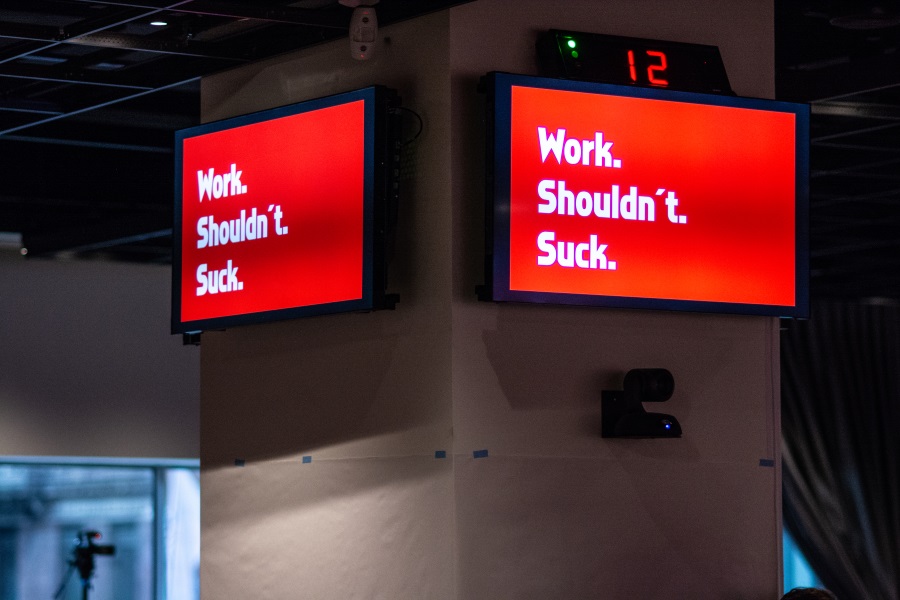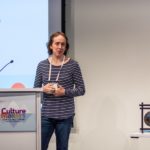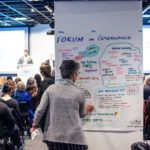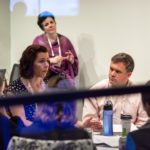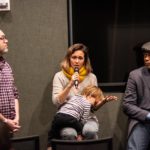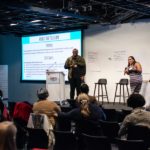This year’s Theatre Communications Group (TCG) Fall Forum on Governance, CultureMakers, provided fresh provocations and tools to improve and innovate the systems we operate in every day. Solutions were prompted when assumptions were questioned—assumptions about the way things have been done and whether that is how they must continue to be done, both in our workplaces, the wider field, and our nation. Why? What if? and How might we…? echoed through the halls of Convene in Midtown Manhattan, as folks donned Fractured Atlas’ “Work. Shouldn’t. Suck.” buttons. The weekend convening in New York City Nov. 9-11 brought theatre leaders and practitioners together to share best practices around building–and changing–organizational culture.
The Eugene O’Neill Theater Center offered a mind-expanding opening night kick-off at the Library at the Public Theater, with the performance of a song from the Kilbanes’ rock opera Eddie the Marvelous, Who Will Save the World, which was developed at the O’Neill’s Musical Theater Conference last summer. “Come in, get used to the gravity / Wears thin, but everything’s easy in time,” Eddie sang, onboarding us into the culture of his intergalactic world.
Earth-rooting us on Saturday morning, Indigenous elder and actor Joan Henry offered a prayer, a land acknowledgement of Manahatta where we stand, and a reminder of the ancestors each of us brings into the room as well as our part in the ancestry of theatre. Calling our attention to the drum of our own heartbeats, she asked us to remember that we are in the business of the sacred.
In an urgent act of bravery, TCG director of communications Gus Schulenburg then took the stage and came out to those assembled as a trans woman—earlier than she had planned, she explained, due to the threat elucidated in a memo from the Trump administration that would seek to erase trans folks from existence. She reminded us that the average life expectancy of a trans woman of color is 35 years. “In a just country that would be considered a national emergency, and our shared resources would go toward healing, not erasure,” said Schulenburg.
Before the first plenary, it was already clear that the role of communication in our field cannot be underestimated. By including Native and trans folks, the gathering’s spotlight fell on concerns about resources committed to erasure instead of healing. How might we shift from silencing to educating? How do the stories we tell on our stages and in our boardrooms affect violence based on cultural affinities? One early takeaway was that boards must also be active participants in issues like the use of pronouns in introductions.
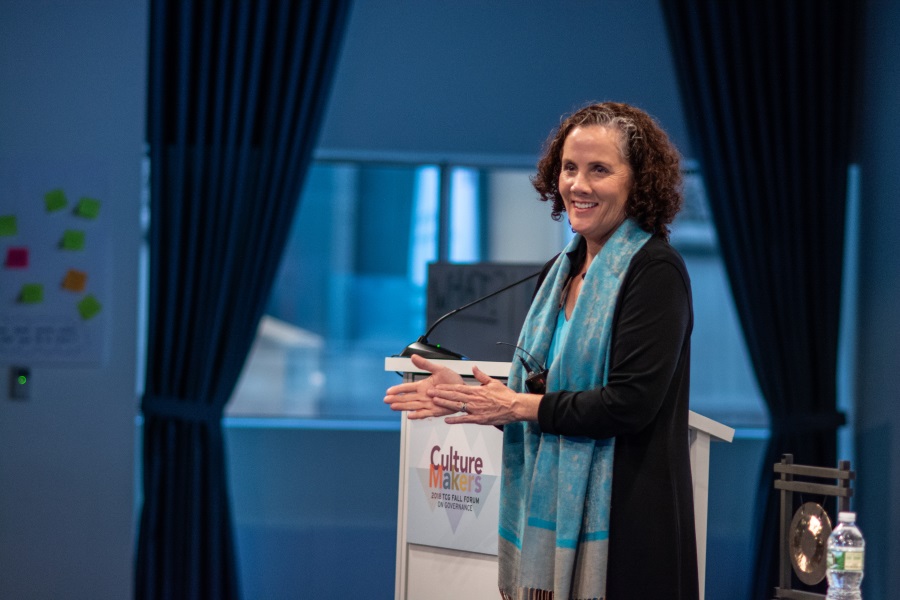
Lauren Freebairn-Smith’s opening keynote, “Change Your Culture, Change the World,” offered the basics of why people organize and how we construct culture, noting that phrases such as “we always,” “we never,” and “that’s gonna fit perfectly” are often markers of a workplace’s culture and values—but they can also be traps. Innovation and connection come when we examine these unquestioned assumptions. Freebairn-Smith offered this reframing: “Money is a form of energy, and if you can understand the flow of it you have power.” In a year with record trustee giving—as well as record trustee attendance at the weekend gathering—it was exciting to see our boards really become a part of holistic conversations about the field.
The entire Forum was buzzing with possibility after the second plenary session, “Invest in People, Invest in Outcomes,” featuring four TED Talk-style presentations from Laura Zabel, executive director, Springboard for the Arts; Tim Cynova, chief operating officer, Fractured Atlas; Karena Fiorenza, general manager, Steppenwolf Theatre; and Joshua Borenstein, managing director, Long Wharf Theatre. The four spoke about shifts in their respective institutions’ cultures.
Springboard’s Zabel encouraged us to listen to our communities and create transparent mechanisms for feedback and adjustments, thereby shifting power to the community and emphasizing that the board’s primary responsibility is community accountability. She also offered some inspirational wisdom about the importance of caring for the people who work for you by making sure they have health insurance and other forms of support.
Similarly, Fractured Atlas’s Cynova warned that if we don’t take care of the culture inside of our institutions, we are lighting our resources on fire by having more people working against us than for us. Fractured Atlas has committed its resources to developing anti-racism and anti-oppression policies and statements, staff trainings, and monthly race-based caucusing. With awareness that the oppressive systems in the U.S. are set up to promote their own self-perpetuation, and will only change through direct and intentional intervention, the organization created an initiative to train artists to run for public office. In a breakout session following the Plenary, Fractured Atlas board member Lisa Yancey reminded listeners: When building your boards, don’t assume that just because someone cannot write you a check that they have no transferable value that can benefit your bottom line.
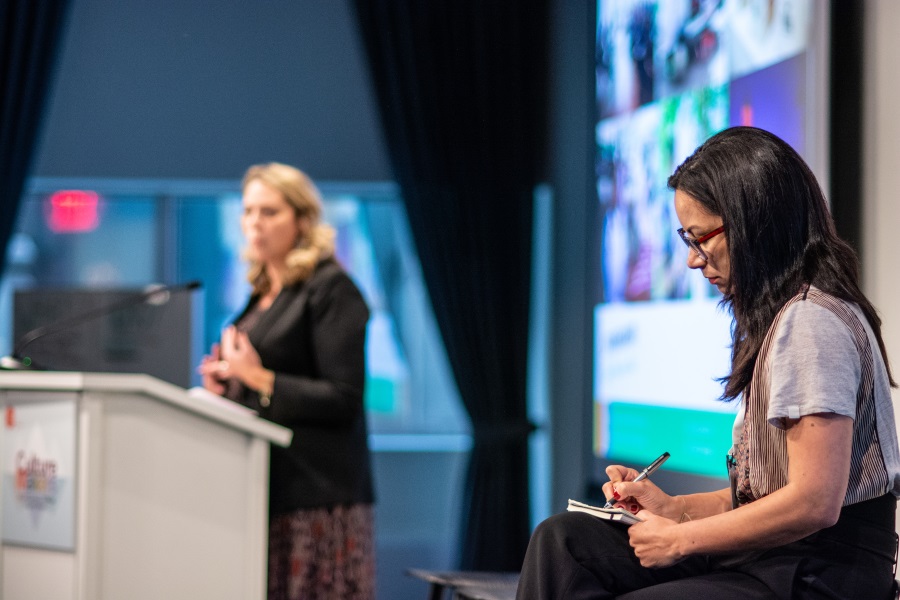
Steppenwolf’s Fiorenza spoke about the ways we exist in different working states: as our authentic self, our adapted self, or our performing self. If folks have to operate in their performing self, she posited, their work will suffer.
Borenstein shared Long Wharf’s analysis after their former artistic director was accused of, and fired for, sexual misconduct in the course of a weekend. Their self-examination revealed that while preventive policies were on the books, the reporting path was not clear. People didn’t know what to do if there was a problem, and the lack of communication disengaged staff members. Long Wharf’s issues were cultural: The staff felt powerless, while the artistic director had too much power to be held accountable for his actions. The theatre’s policy now promotes clarity and transparency and constant staff communication, and aims to make it more comfortable to call out abuses of power.
In a follow-up discussion, facilitator Stephanie Ybarra, incoming artistic director at Baltimore Center Stage, asked the question burning in many minds: that of bandwidth. “How do each of you make the case to yourself and to your teams to invest in culture,” she wondered, “when so much other stuff can be on fire at any given time?”
Answered Zabel, “You can’t put out the fire if you don’t attend to the underlying conditions of that fire.” Added Borenstein, “If the culture is not healthy, if people do not feel empowered, they are not going to do their best work.”
All of the leaders assembled were challenged to dig deep and treat root causes, not just symptoms, at their theatres. This year even sessions on fiscal data turned to dialogue about the individuality of each community in determining what’s right for them in the balance between contributed and earned income. The uniqueness of our institutions and the communities in which they operate felt very present.
As the conference came to a close, the final plenary asked artistic leaders to look ahead. Oskar Eustis, artistic director of New York’s Public Theater; Linette Hwu, board president, Woolly Mammoth Theatre Company in Washington, D.C.; Teresa Coleman Wash, executive artistic director, Bishop Arts Theatre Center in Dallas; and yours truly were asked to imagine; What is our vision for the future of our institutions?
Eustis spoke about on his experience institutionalizing counterculture—and the need to fight sexism, racism, and classism in the present—as a means to change the culture of our world. Hwu asked: How does the board fit into an organization’s culture? If you don’t have an answer to that question, there will ultimately be a disconnect between your board and the rest of the organization. Also: Are you currently communicating that the only contributions you want from your board are financial?
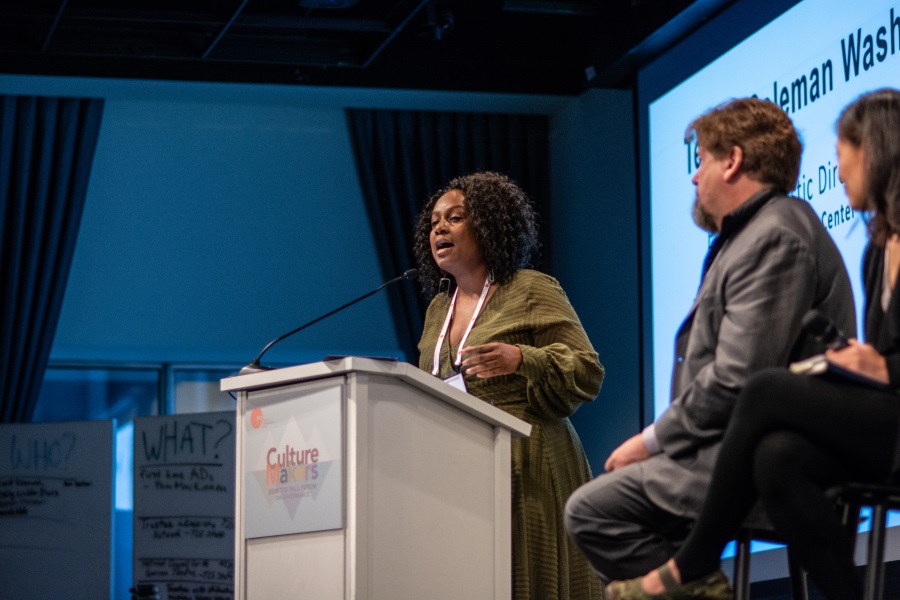
Coleman Wash reminded us that very few opportunities exist for artists to receive affordable healthcare and a decent retirement plan. This, coupled with the stress of a white supremacy ideology that values products over people, challenges retention of top-notch talent in our field. “A well crafted EDI statement is not the antidote to centuries of oppression,” she said. “For every injustice in the world there is an architect that perpetuates it.”
My contribution to the final plenary was a vision for awareness that there is no cultural neutral. My storyteller role models were my Mohegan aunties, Native women who had the power to transform for the benefit of their community. The European theatre model showed me that that power has been traditionally reserved for white men. Having seen another model, I knew another possibility, and now we can see the American theatre slowly working away from redface on our stages. I offered my dream for institutional self-awareness that there is no neutral.
As a freelancer, moving among both theatre institutions and diverse Indigenous nations, it can be incredibly obvious that every institution, like every nation, has its own culture and protocols. Sometimes those cultures are accidental, and our best onboarding comes from gossip instead of intentionality. In each place the rules have been made up and we may choose to make better rules in response to the unique needs of our communities. I try to listen to each place I arrive, find out what the unique rules are through questions, learn what folks’ favorite things are about their institution, as well as ask what they aspire to do better. If you are intentional with the institutional culture you create, you have a hope of creating a healthy community and not passing down your trauma.
I closed the session at the Fall Forum by offering folks the opportunity to release and heal that institutional trauma by eliminating what they didn’t want anymore, and to cast their vision forward to the future of their institution. What kind of ancestors did they want to be? I asked them. We need only turn that answer into reality.
I’m looking forward to seeing the outcomes of this year’s conference on governance, and the ways it will spark innovations in board dynamics, capitalization, fiscal models, and governance structures that are more intersectional than ever before. My reading list, like that of many other attendees, now has Emergent Strategy: Shaping Change, Changing Worlds by adrienne maree brown, at the top.
Madeline Sayet is a director of new plays, classics, and opera who believes the stories we pass down inform our collective possible futures. For her work as a director she was named to Forbes’ 2018 30 Under 30 List in Hollywood & Entertainment, and has been honored as a TED Fellow, a MIT Media Lab Director’s Fellow, a National Directing Fellow, and a recipient of The White House Champion of Change Award from President Obama. www.madelinesayet.com.

